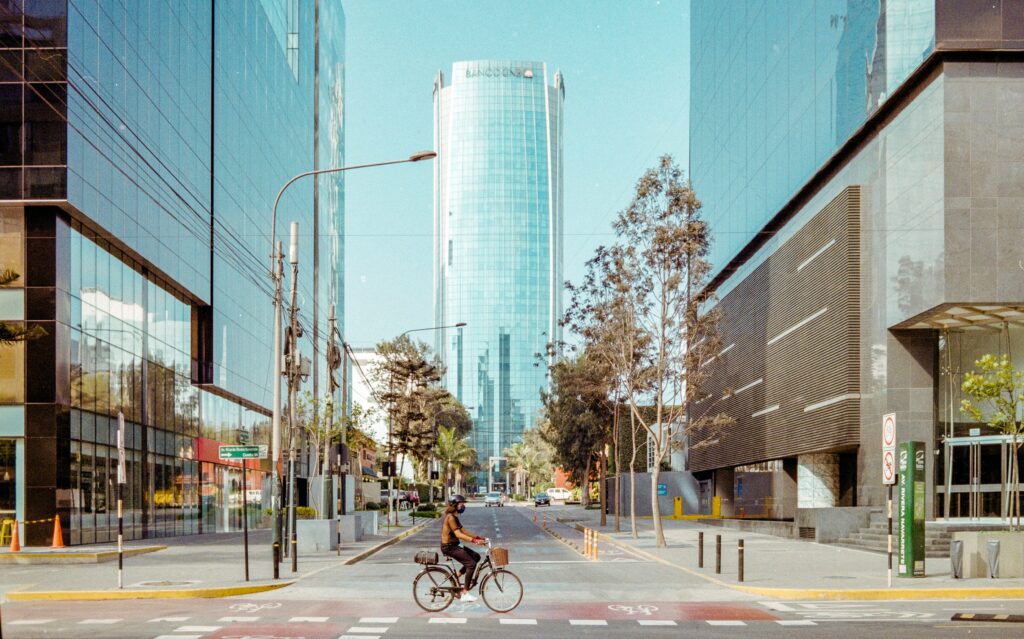Switch. Sync. Simplify: How Smart Glass is Shaping the UAE’s Smart Cities Vision
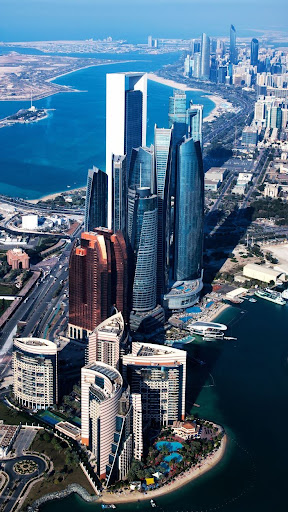
Glass used to be passive, transparent, functional, and decorative at best. But in the UAE’s fast-evolving smart cities, it has become something much more. Today, glass is intelligent. It adapts. It communicates. It simplifies.
From Expo City Dubai’s net-zero ambitions to Masdar City’s AI-enabled infrastructure, the region is rapidly building urban environments that not only respond to human needs but anticipate them. And quietly embedded in this transition is a material that’s rewriting the rules of architecture, smart glass.
As cities become more connected, dynamic materials like smart glass are no longer futuristic luxuries. They’re core infrastructure.
UAE’s Smart Cities, Engineered for Tomorrow
The UAE’s commitment to digital urbanism has already positioned it as a global leader in smart city development. With projects like Masdar City in Abu Dhabi and the post-Expo evolution of Expo City Dubai, the country’s urban future is rooted in three essentials, sustainability, automation, and data-driven living.
According to recent industry reports, the UAE’s smart building market was valued at USD 1.31 billion in 2023 and is expected to reach USD 8.99 billion by 2030, growing at a staggering 31.7% CAGR. Within this, smart glass is emerging as one of the most sought-after technologies for architects and developers. In the MENA region alone, the smart glass market is forecasted to rise from USD 325.1 million in 2023 to USD 663.7 million by 2030, with a CAGR of over 10%.
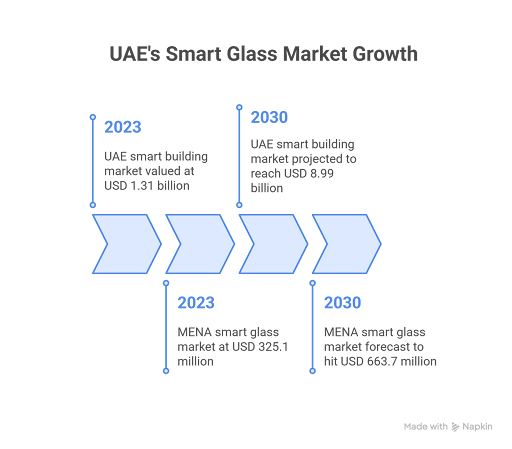
This rapid growth is being fueled by increased investment in sustainable design, government-led green building initiatives, and a tech-savvy construction ecosystem that’s constantly evolving.
Reinventing Glass for the Smart City Era
Smart glass refers to advanced glazing that can alter its appearance, transparency, or heat transmission properties based on environmental triggers or electrical input. Whether it’s electrochromic, thermochromic, photochromic, or PDLC-based, smart glass adapts in real-time enhancing energy efficiency, comfort, and privacy.
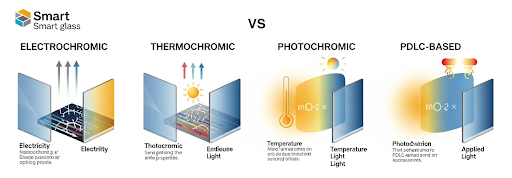
Smart film offers similar benefits and can be retrofitted to existing glass structures, making it a flexible and cost-effective option for both new developments and renovations.
Core functionalities include:
- On-demand privacy control
- Dynamic light and glare management
- Temperature regulation and solar control
- Seamless integration with building management systems
- Sleek, modern aesthetics that support open, minimalist design
In short, it’s functional, futuristic, and fully aligned with the needs of smart buildings.
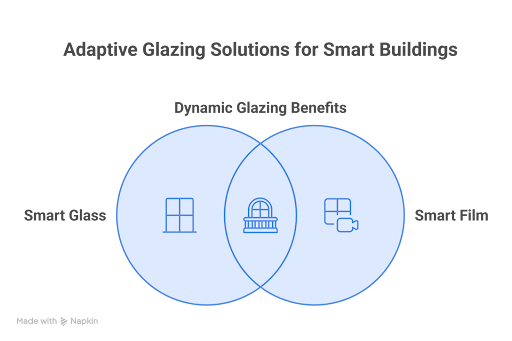
Design That Listens, Learns, and Responds
What makes smart glass a game changer isn’t just its appearance, it’s how it fits into a connected ecosystem. In smart cities, materials must be as intelligent as the systems they support. That means buildings that adjust themselves in response to weather, occupancy, or usage data and glass that doesn’t just stand still.
In the UAE, smart glass is now part of the conversation between architecture and automation.
- IoT Integration: Connects directly to thermostats, lighting systems, and AI-enabled controls.
- Voice & Motion Compatibility: Works with voice assistants like Alexa or motion sensors for seamless user interaction.
- Data Feedback: Provides input on occupancy and light exposure, contributing to more efficient HVAC and energy usage decisions.
These capabilities turn smart glass into a real-time responsive surface one that contributes to operational intelligence.
Smart Glass in Action Across the UAE
Expo City Dubai
Originally built for Expo 2020, this car-free, AI-powered district is now a flagship for sustainable, high-performance urban design. Smart glass has been used across pavilions and commercial spaces to regulate light and reduce cooling demands, aligning with the city’s goal of becoming net-zero by 2050.
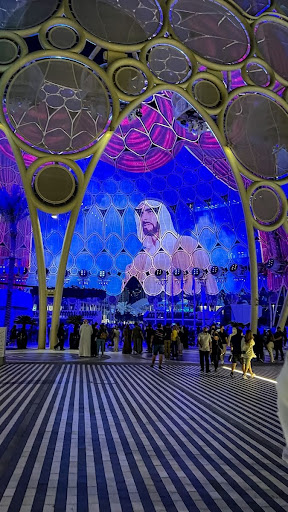
Masdar City, Abu Dhabi
As one of the world’s most ambitious sustainable urban projects, Masdar City leverages electrochromic glass across office buildings and research centers to minimize solar heat gain and reduce the need for artificial lighting. The result: energy savings of up to 45% in some zones and enhanced occupant well-being.
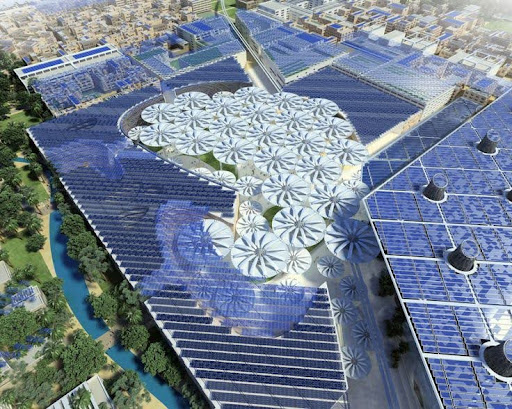
DIFC Offices and Luxury Hotels
From high-end office towers in DIFC to hotels with uninterrupted views of the Burj Khalifa, smart glass is now a standard in modern design. Whether it’s for privacy in meeting rooms or mood control in penthouse suites, developers are choosing smart glass to elevate both functionality and experience.
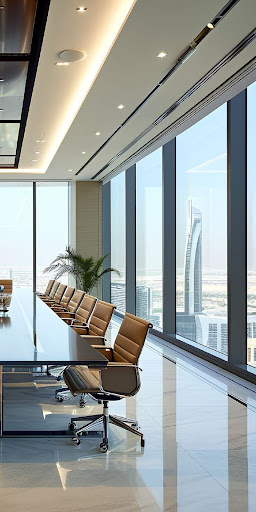
Not Just a Trend, A Smarter Standard
| Feature | Impact |
| Energy Efficiency | Reduces AC usage by up to 30% and lowers electricity costs overall. |
| Sustainability Alignment | Supports LEED and Estidama certifications. |
| Enhanced Privacy & Comfort | Allows dynamic transitions between open and private spaces. |
| Aesthetic Versatility | Clean, curtain-free look perfect for modern and minimalist designs. |
| Tech Integration | Works with building automation and IoT platforms for smart management. |
The Pros and the Pitfalls
| Pros | Considerations |
| Immediate control over privacy and lighting | Higher upfront costs compared to conventional glass |
| Long-term energy and cost savings | Requires professional installation and system integration |
| Supports smart city automation | Some types require a consistent power supply |
| Elevates property value and tenant appeal | Retrofit options may vary based on building age and glass type |
Fast Facts That Matter
- Up to 15% Carbon Reduction: Smart glass can significantly lower a building’s carbon footprint, supporting green building goals.
- Energy Savings of 7–16%: Electrochromic windows can reduce HVAC energy consumption by up to 16%, depending on climate and building design.
- Instant Privacy: PDLC smart glass transitions from clear to opaque in under 0.1 seconds, ideal for on-demand privacy.
- UV Protection: Most smart glass blocks over 99% of harmful UV rays, preserving interiors and protecting occupants.
- Rapid Market Growth: The global smart glass market is expected to exceed USD 15 billion by 2030, with the Middle East emerging as a key innovation and adoption hub.
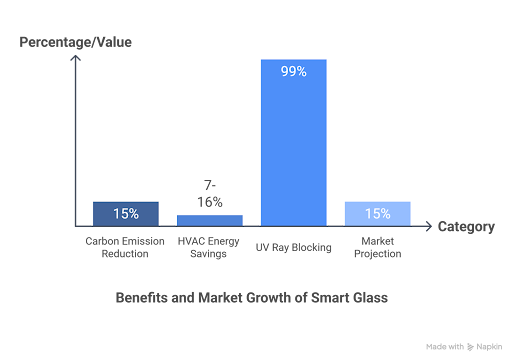
The Future is Clear and Switchable
In a skyline defined by innovation, smart glass is driving the UAE’s shift toward smarter, greener, and more responsive buildings.
From cutting energy costs to transforming user experience, it’s the upgrade future-ready projects can’t afford to miss.
Take the lead! connect with top UAE smart glass experts today and build the future with clarity.
FREQUENTLY ASKED QUESTIONS
Is smart glass reliable in hot climates like the UAE?
Yes, smart glass products used in the UAE are specifically engineered to withstand high temperatures, intense sunlight, and UV exposure, ensuring consistent performance year-round.
Can it really save energy?
Definitely. Smart glass helps regulate indoor temperatures by controlling heat and light, leading to energy savings of up to 20–30%, particularly in cooling-heavy environments like the UAE.
Can I apply smart film to my current windows?
Yes, smart film is a retrofit-friendly solution that can be applied to existing glass, offering the benefits of smart glass without the need for full window replacement.
Is smart glass compatible with home automation systems?
Yes, most smart glass systems easily integrate with smart home platforms like Alexa, Google Home, or custom building management systems for convenient control.
What’s the difference between electrochromic and PDLC smart glass?
Electrochromic glass changes tint gradually with electrical signals, ideal for sun control on exterior windows. PDLC glass switches instantly between transparent and opaque, perfect for indoor privacy.
Is maintenance difficult?
Not at all. Smart glass requires only standard glass cleaning and periodic checks on wiring or control units, no special maintenance is needed.
How long does smart glass last?
With proper installation and care, smart glass can last 10 to 15 years or more, maintaining its clarity, responsiveness, and functionality over time.
Does it help with sustainability certifications?
Yes, smart glass supports energy efficiency and indoor comfort goals, contributing points toward LEED, WELL, and Estidama certifications for green buildings.
Can it be used in residential properties?
Absolutely. Smart glass is increasingly popular in modern villas, high-end apartments, and even for smart bathrooms and balconies to enhance both style and privacy.
Where is smart glass already being used in the UAE?
Smart glass is featured in prominent projects like Expo City Dubai, Masdar City, DIFC offices, luxury hotels, private medical clinics, and premium residential developments in Dubai and Abu Dhabi.
Innovative Smart
Glass Features
Energy Efficiency
How Does Smart Glass Improve Your Experience In Homes?
Smart glass renders instant privacy at the touch of a button while pouring in the natural light to illuminate your living settings. Visit your nearby store or explore our website to stay updated about the latest trends in smart glass.


